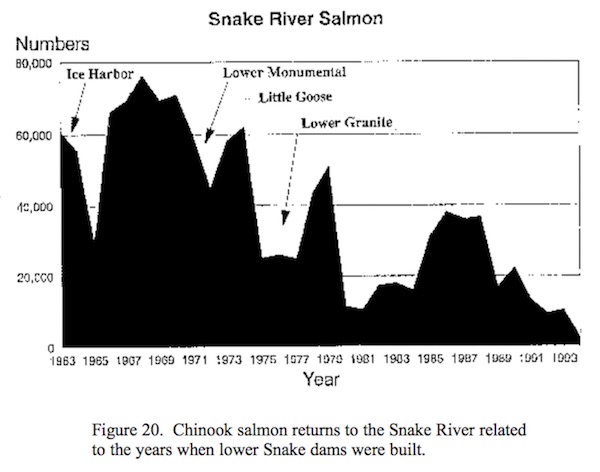forum
library
tutorial
contact

Congressman Mike Simpson Pushes Dam Breaching Plan
to Southern Idaho County Commissioners
by Zac Ezzone
Big Country News, April 2, 2021
|
the film forum library tutorial contact |

|
Congressman Mike Simpson Pushes Dam Breaching Plan
by Zac Ezzone
|
"I like fish; I love salmon, but I love people more,"
-- Twin Falls County Commissioner Don Hall
 TWIN FALLS -- U.S. Rep. Mike Simpson made his way through the Magic Valley this week to discuss his proposal for breaching the four dams on the Lower Snake River.
TWIN FALLS -- U.S. Rep. Mike Simpson made his way through the Magic Valley this week to discuss his proposal for breaching the four dams on the Lower Snake River.
In February, Simpson released the details of his $33.5 billion plan, which aims to end what he calls the "salmon wars." This is in reference to the countless lawsuits environmental groups have filed blaming the dams for decimating Idaho salmon, which are heading toward extinction, according to Simpson.
The long-time congressman centered his pitch to Magic Valley residents and county commissioners on the idea that these dams, which are located hundreds of miles away, have few benefits for southern Idaho.
"I keep asking myself, in southern Idaho, in the Magic Valley, do we really care about those dams when you look at the economics of it?" Simpson said during a meeting with Jerome County Commissioners.
For starters, Simpson said, Idaho is required to send 487,000 acre feet of water down the river annually to try to restore salmon. This is less water available for farmers to use for irrigation or that could be stored in local aquifers.
Despite sending this additional water down the river to flush salmon toward the ocean, Idaho salmon are on heading toward extinction, which would be an economical and environmental loss for the region, Simpson said. Meanwhile, salmon in Washington are not facing these dwindling population numbers.
Simpson said southern Idahoans don't see much benefits from the dams in exchange for these costs. For example, Idahoans receive only about 8% of the energy the Bonneville Power Administration creates through the operation of these dams.
And while Simpson acknowledged his plan would affect Idaho grain producers who transport their product through the Port of Lewiston, he said this isn't a problem that would affect the Magic Valley as much. Most local wheat producers truck their product to either Salt Lake City or the Tri-Cities in Washington, he said.
Simpson told the Times-News he decided to hold a series of meetings with county commissioners in Twin Falls, Gooding, Lincoln, Jerome, Minidoka and Cassia counties to explain these costs and benefits, as well as to hear his constituents' thoughts on the proposal.
During the Twin Falls County meeting, Commissioner Don Hall said he was concerned about people potentially losing their jobs as a result of the dam breaching.
"I like fish; I love salmon, but I love people more," Hall said to applause from the residents in attendance.
Hall also said he was concerned about the price tag attached to the proposal and how it could worsen the nation's debt. This was a concern multiple residents brought up in various meetings.
Simpson told the Times-News that he understands these concerns, especially after the federal government recently spent $1.9 trillion on COVID-19 relief in a package the didn't receive any Republican support in Congress. Now the federal government is considering another $2.3 trillion infrastructure package that President Joe Biden outlined on Wednesday.
Simpson could try to secure some funding for his proposal in this package, because if it's going to pass, it might as well benefit the Pacific Northwest, he said. But he isn't sure he'll support the plan, which he said goes beyond infrastructure and is funded through an increase to the corporate tax rate.
On top of concerns expressed from local residents at these meetings, Simpson's plan has been met with backlash from prominent Idaho state Republicans, like Gov. Brad Little who said breaching the dams "would have devastating impacts on Idahoans and vital segments of Idaho's economy" in a statement his office released.
Speaker of the House Scott Bedke has raised questions about the plan, and the Cassia County Republican Central Committee recently approved a resolution opposing the proposal.
But Simpson said he isn't surprised by these reactions. There are some people calling the proposal a horrible idea, some interesting in learning more about it and others who are thrilled with the concept.
He said he wants to take his time to hear from all of these people before introducing a bill in Congress. But he also acknowledges something must be done before it is too late.
"Make no doubt about it, Idaho salmon will go extinct if something isn't done," Simpson said during the Jerome County meeting.
There was at least one resident at the Jerome meeting who seemed to support this point. Carl Nellis thanked the congressman for introducing a plan that offers a different approach to saving Idaho salmon.
"We're going to pay either for continuing programs that haven't worked or we're going to pay for continuing programs that might work," Nellis said. "My preference is we continue to pay for something that might work."
learn more on topics covered in the film
see the video
read the script
learn the songs
discussion forum
